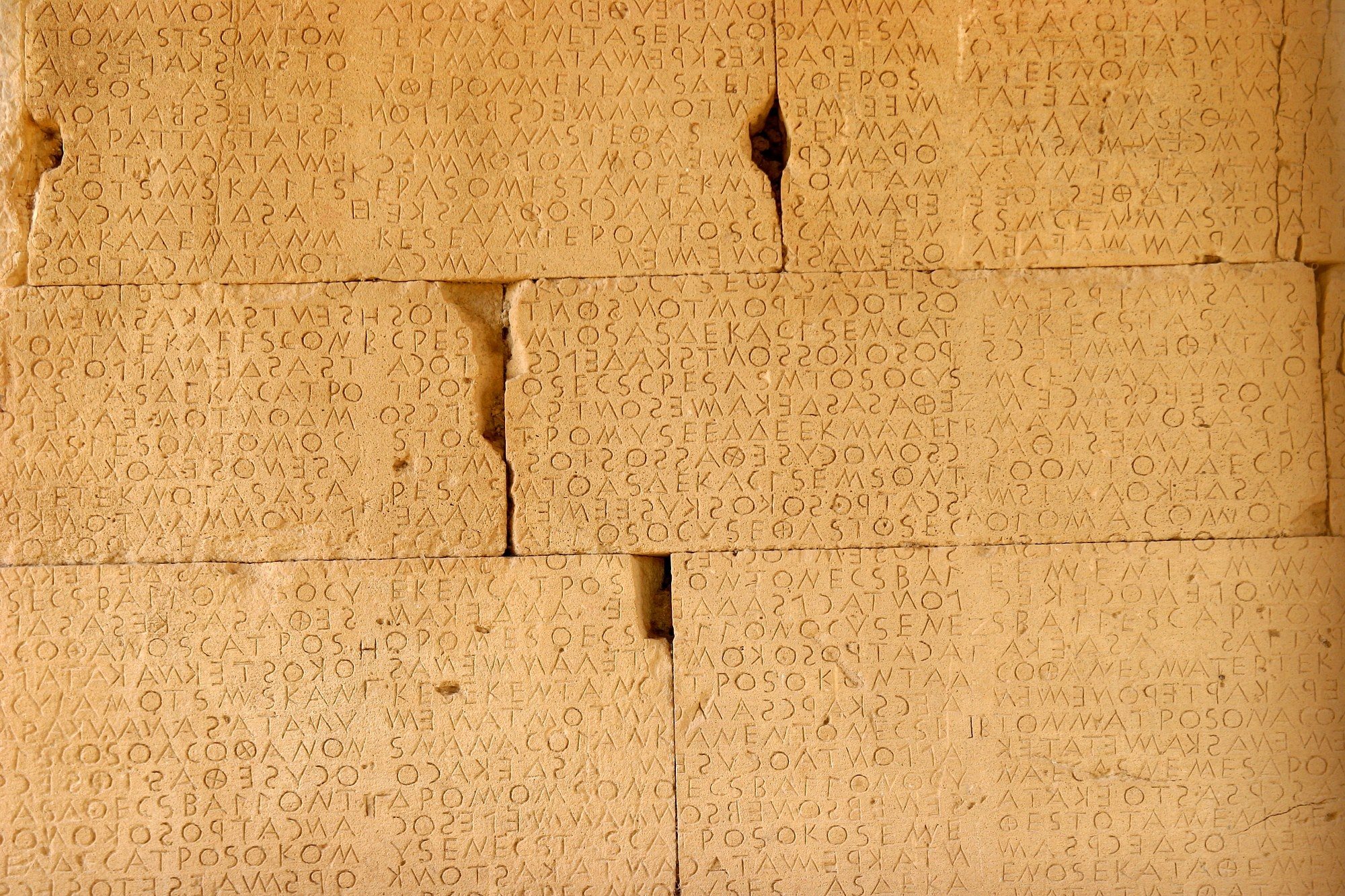Variant of what the others have said.
Ruins featuring Roman era Koine? There’ll be some faux amis, but the alphabet shape is recognisable, the grammar and vocabulary you can cope with if you’re educated.
Ruins from 500 BC? The alphabet shapes vary from city to city; the ancient dialects can be very different from Attic. Can you? Not without specialist training.
I’ll counter Dimitrios Michmizos’ answer with the Gortyn code. A scripture (well, a legal code) in ruins in Crete. In Doric and boustrophedon.

… Yeah.
OK, how about a transcription. From IC IV 72 – PHI Greek Inscriptions . With NO HINTS of long vowels (no etas and omegas, the original doesn’t have them), and no accents. I’ll give you spaces between words.
αἰ δε κα πονει δολοσαθθαι, ὀμοσαι τον ἐλοντα το πεντεκονταστατερο και πλιονος πεντον αὐτον ϝιν αὐτοι ϝεκαστον ἐπαριομενον, το δ’ ἀπεταιρο τριτον αὐτον, το δε ϝοικεος τον πασταν ἀτερον αὐτον μοικιοντ’ ἐλεν, δολοσαθθαι δε με.
I’m sure you’re making out some words…
EDIT Joachim Pense Dimitra Triantafyllidou Philip Newton
αἰ δε κα πονει δολοσαθθαι, ὀμοσαι τον ἐλοντα το πεντεκονταστατερο και πλιονος πεντον αὐτον ϝιν αὐτοι ϝεκαστον ἐπαριομενον, το δ’ ἀπεταιρο τριτον αὐτον, το δε ϝοικεος τον πασταν ἀτερον αὐτον μοικιοντ’ ἐλεν, δολοσαθθαι δε με.
Putting in omegas and etas AND chis and phis:
αἰ δέ κα φωνῆι δολώσαθθαι, ὀμόσαι τὸν ἐλόντα τῶ πεντηκονταστατήρω καὶ πλίονος πέντον αὐτὸν ϝὶν αὐτῶι ϝέκαστον ἐπαριόμενον, τῶ δ’ ἀπεταίρω τρίτον αὐτὸν, τῶ δὲ ϝοικέος τὸν πάσταν ἄτερον αὐτὸν μοιχίοντ’ ἐλέν, δολώσαθθαι δὲ μή.
Attic equivalent:
εἰ δ’ ἂν φωνῇ δολώσασθαι, ὀμόσαι τὸν ἐλόντα τοῦ πεντηκονταστατήρου καὶ πλείονος, πέμπτον αὐτόν, αὐτὸν αὐτῷ ἔκαστον ἐπαρώμενον, τοῦ δὲ μετοίκου τρίτον αὐτὸν, τοῦ δὲ οἰκέτου τὸν δεσπότη ἕτερον αὐτὸν μοιχοῦντ’ ἐλεῖν, δολώσασθαι δὲ μή.
but if anyone should declare that he has been taken by subterfuge, the captor is to swear, in a case involving fifty staters or more, with four others, each calling down solemn curses upon himself, and in the case of an apetairos [resident alien] with two others, and in the case of a serf the master and one other, that he took him in adultery and not by subterfuge.
EDIT: Mohammad Yamini. Ah, I too have just noticed the actual inscription. I will transcribe it, seeing as how I can’t find it online. There’s a couple of words I don’t understand; I’ve put question marks for them.
Μενέδημος Ἀπολλοδότῳ καὶ Λαοδικέῳ τοῖς ἄρχουσι καὶ τῇ πόλει χαίρειν. Τοῦ γραφέντος πρὸς ἡμᾶς προστάγματος [ ] βασιλέως ὑποτέτακται [] τάφον κατακολουθεῖτε οὖν τοῖς ἐπεσταλμένοις καὶ φροντίσατε ὅπως ἀναγραφὲν τὸ πρόσταγμα εἰς στήλην διοινὴν (?) ἀνατεθῇ ἐν τῷ ἐπιφανεστάτῳ τῶν ἐν τῇ πόλει ἱερῶν.
Ἔρρωσθε οιρ. Πανήμου.
Βασιλεὺς Ἀντίοχος Μενεδήμῳ χαίρειν. [ ]μενοι τῆς ἀδελφῆς βασιλίσσης Λαοδίκης τὰς τιμὰς ἐπὶ πλεῖον αὔξειν καὶ τοῦτο ἀναγκαιότατον ἑαυτοῖς νομίζοντες εἶναι διὰ τὸ μὴ μένον (?) ἡμῖν φιλοστόργως καὶ κηδεμονικῶς
Menedemus to Apollodotus and Laodiceus, the leaders, and to the city: greetings! Of the command written to us … has submitted to the king … tomb, so follow what has been written to you, and take care that the command be put up in an inscription in a (?) column in the most prominent of the temples in the city.
Hail. (?) of Panemus.
King Antiochus to Menedemus: greetings! []ing to increase the honours of our sister queen Laodice, and considering to ourselves that this is most necessary, not only so that we caringly and as a guardian…
Thank God I found a transcription of the same decree at this point, though written to another destination:
A X O N
Yeah, we can read it. I’ll excuse myself from transcribing and translating the rest, and will let you do Google translate on the Italian translation instead.
I woiuld not have worked out οιρ: it’s θιρ, which is the Year 119 of the Seleucid empire (193 BC), only normally it would be ριθ.
